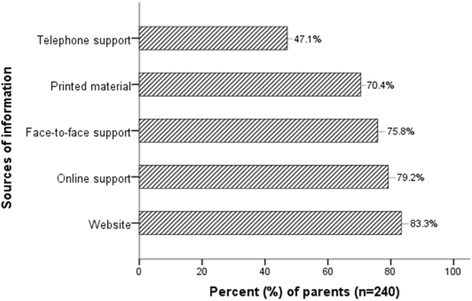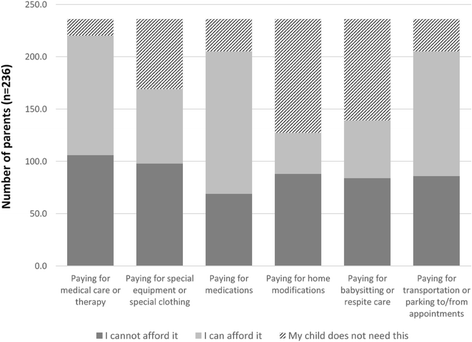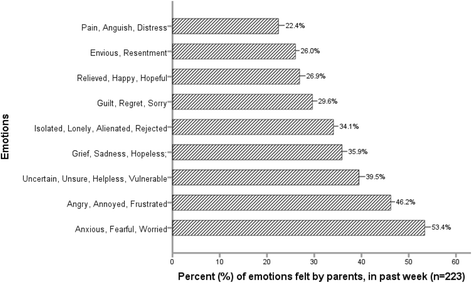The supportive care needs of parents with a child with a rare disease: results of an online survey
- PMID: 27439905
- PMCID: PMC4955113
- DOI: 10.1186/s12875-016-0488-x
The supportive care needs of parents with a child with a rare disease: results of an online survey
Abstract
Background: Parents caring for a child affected by a rare disease have unmet needs, the origins of which are complex and varied. Our aim was to determine the supportive care needs of parents caring for a child with a rare disease.
Methods: An online survey was developed consisting of 45 questions (108 items) and separated into six domains. The survey included questions about perceived level of satisfaction with receiving care, experiences and needs of providing daily care, the impacts of disease on relationships, the emotional and psychological burdens of disease, and parents overall satisfaction with the support received.
Results: Three-hundred and one parents from Australia and New Zealand completed the survey; 91 % (n = 275/301) were mothers, with 132 distinct rare diseases being reported. Fifty-four percent (n = 140/259) of parents were dissatisfied with health professionals' level of knowledge and awareness of disease; 71 % (n = 130/183) of parents felt they received less support compared to other parents. Information regarding present (60 %, n = 146/240) and future services (72 %, n = 174/240) available for their child were considered important. Almost half of parents (45 %, n = 106/236) struggled financially, 38 % (n = 99/236) reduced their working hours and 34 % (n = 79/236) ceased paid employment. Forty-two percent (n = 99/223) of parents had no access to a disease specific support group, and 58 % (n = 134/230) stated that their number of friends had reduced since the birth of their child; 75 % (n = 173/230) had no contact with other parents with a child with a similar disease, and 46 % (n = 106/230) reported feeling socially isolated and desperately lonely. Most frequent emotions expressed by parents in the week prior to completing the survey were anxiety and fear (53 %, n = 119/223), anger and frustration (46 %, n = 103/223) and uncertainty (39 %, n = 88/223).
Conclusion: This study is the first to develop an online survey specifically for use with parents to investigate their supportive care needs across a large and diverse group of rare diseases. The findings highlight that parents with a child with a rare disease have common unmet needs regardless of what disease their child has. Such information may allow health providers to improve child outcomes through improving parental supportive care.
Keywords: Disease burden; Health providers; Needs assessment; Online survey; Parents; Rare diseases; Supportive care.
Figures
References
-
- de Vrueh R. Why R&D into Rare Diseases Matter. In: Bali RK, Bos L, Gibbons MC, Ibell S, editors. Rare Diseases in the Age of Health 2.0. Communications in Medical and Care Compunetics. Heidelberg: Springer Berlin; 2014. pp. 3–20.
-
- Eurordis EOfRD. Rare diseases: understanding this public health priority. 2005. http://www.eurordis.org/IMG/pdf/princeps_document-EN.pdf. Accessed 13 April 2013.
MeSH terms
LinkOut - more resources
Full Text Sources
Other Literature Sources
Medical




